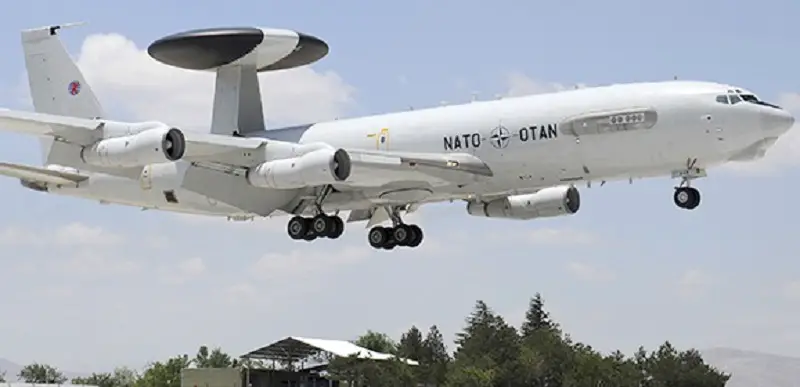Indra will work on the modernization of the AWACS, the early warning, surveillance and command and control aircraft which NATO has used to protect the sky of the allied countries for decades and has contributed to the Alliance’s huge superiority in collecting intelligence and directing operations in the most complex scenarios.
Equipped with an unmistakable radar mounted on top of the fuselage, this military aircraft based on the Boeing 707 can detect any hostile aircraft flying at low altitude to circumvent air defense systems within a range of over 400 kilometers. It also locates objectives at sea and offers an improved capacity for command and control of air, land or sea operations.
Each of these aircraft can monitor more than 310,000 kilometers single-handedly. These planes protected and defended the US sky after the 9/11 terrorist attacks and backed the Alliance’s interventions in Iraq, Afghanistan or Syria. They have been a key asset in the fight against the Islamic State (ISIS) and piracy and have protected the skies of allied countries during major events and the Olympics.
On November 27, NATO Secretary General Jens Stoltenberg announced in Brussels the signing of a $1 billion contract to modernize the aircraft and extend its useful life until 2035. One of the objectives of this program will be to provide the platform with much more sophisticated communications and network data exchange capabilities.
For his part, the president of Boeing International, Michael Arthur, cited Indra among the members that will be part of the industrial alliance of European and North American companies that will address what is known as the AWACS Final Lifetime Extension Program (FLEP).
This contract confirms Indra’s position as one of the leading technology companies in military aeronautics. A leading role that continues to grow as these platforms incorporate avionics systems and digital solutions that are increasingly advanced and complex.
Indra is the second supplier of avionics systems of the Eurofighter and its technology equips aircraft such as the A400M, the F18 or the Tiger helicopter, among others.
Recently, Indra has been nominated by the Spanish Government as an industrial coordinator for the development of the Future Air Combat System (FCAS). This “system of systems” is based on a new generation of aircraft that will operate alongside several drones and that will be able to interoperate through a powerful combat cloud with all types of platforms and aerial, land, naval and cyber environments.
Indra is a global leader in the sector and provides end-to-end solutions in the five areas of Defense: Land, Sea, Air, Space and Cyberspace, with a firm commitment to integrated systems and proprietary technologies in all the strategic areas in which it operates, combining the physical and digital worlds.
Indra is one of the main global technology and consultancy companies and the technological partner for its customers’ key business operations around the world. It’s a major global supplier of proprietary solutions in specific segments of the Transportation and Defense markets and a leading company in digital transformation and information technology consultancy in Spain and Latin America by means of its Minsait subsidiary. Its business model is based on a comprehensive range of proprietary products, with an end-to-end approach that has high value and a significant innovative component. In 2018 Indra received income totaling 3.104 billion euros and had 43,000 employees, a local presence in 46 countries and business operations in more than 140 countries.
















